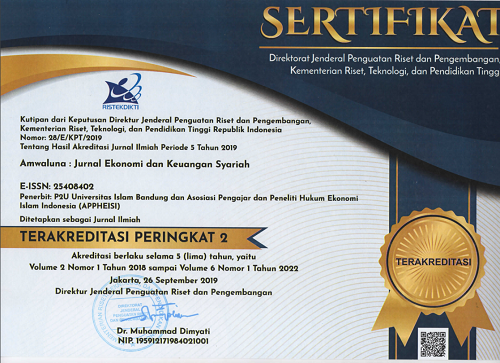REVIEWING THE CONCEPT OF JIZYAH: A THEORETICAL APPROACH TO HISTORY
Abstract
In the treasures of Islamic civilization, Muslims recognize many State income instruments, one of which is jizyah, which is a contribution that must be paid by unbelievers who settled in the Islamic State to obtain protection and guarantee that they will live there. With the continued development of science and culture, some scholars state that jizyah is only imposed on the book's people, and jizyah is a form of oppression for non-Muslims, even though this is not true. So, this research seeks to present historical facts taken from history books and research that discuss jizyah. This type of research is a literature review using descriptive qualitative methods. As for the results of the study, that the initial stipulation of jizyah was at the time of the Prophet precisely after the Tabuk war event in 9 H. Then the jizyah continued during the time of Khulafa Rasyidin and continued to grow, especially during the Caliph Umar regarding the provisions of jizyah applicable from those previously imposed on group representation to each capable non-Muslim people. Then, jizyah's wisdom and purpose are contained in Al-Quran Surah At-Taubah verse 29, that with the existence of jizyah, the non-Muslims are given life protection in an Islamic state. With jizyah, non-Muslims get security, comfort, convenience in dealing with Muslims, welfare, and security guarantees for their property.
Keywords
Full Text:
PDFReferences
Abadi, F. (2005). Al-Qamus Al-Muhith (Ke-8). Beirut: Al-Resalah Publisher.
Adian Husaini, N. H. (2002). Islam Liberal: Sejarah, Konsepsi, Penyimpangan, dan Jawabannya. Jakarta: Gema Insani.
Ahmed, Z. (1975). Jizyah In Early Islam. Islamic Studies, 14(4), 293–305.
Al-Farran, S. A. M. (2008). Tafsir Imam Syafi’i. Jakarta: Almahira.
Al-Haritsi, J. bin A. (2006). Fikih Ekonomi Umar bin Al-Khathab. Jakarta: Khalifa.
Al-Mawardi, I. (2014). Ahkam Sulthaniyah: Sistem Pemerintahan Khilafah Islam (K. Fath & Fathurrahman, trans.). Jakarta: Qisthi Press.
Al-Quraibi, I. (2009). Tarikh Khulafa. Jakarta: Qisthi Press.
Ali, M. M. (2013a). Islamologi (Ke-8). Jakarta: Darul Kutubil Islamiyah.
Ali, M. M. (2013b). Khulafaur Rasyidin: Kisah Empat Khalifah Rasulullah SAW. Jakarta: Darul Kutubil Islamiyah.
An-Nabhani, T. (2002). Membangun Sistem Ekonomi Alternatif; Perspektif Islam, terj. Moh. Maghfur Wachid. Surabaya: Risalah Gusti.
Dhoif, S. (2004). Al-Mu’jam Al-Wasith (Ke-4). Mesir: Maktabah Al-Syuruq Ad-Dauliyah.
Gusfahmi. (2007). Pajak Menurut Syariah. Jakarta: Raja Grafindo Persada.
Hart, M. (2017). 100 Tokoh Paling Berpengaruh di Dunia (Revised Ed; Hanif, ed.). Jakarta: Noura Books.
Jajuli, S. (2016). Ekonomi Islam Umar bin Khattab. Yogyakarta: Deepublish.
Mahmud, A. A. H. (1996). Karakteristik Umat Terbaik Telaah Manhaj, Akidah, dan Harakah. Jakarta: Gema Insani.
Mannan, M. A. (1995). Teori dan Praktik Ekonomi Islam. Yogyakarta: Dana Bhaki Prima Yasa.
Muhammad Iqbal. (2014). Fiqh Siyasah (Ke-2). Jakarta: Kencana.
Nashif, S. M. A. (1996). Mahkota Pokok-Pokok Hadits Rasulullah SAW. Bandung: Sinar Baru Algesindo.
Peerzade, S. A. (2010). Jizyah: A misunderstood levy. Journal of King Abdulaziz University, Islamic Economics, 23(1), 151–161.
Qardhawi, Y. (1997). Hukum Zakat, terj. Salman Harun, dkk. Jakarta: Pustaka Litera Antar Nusa.
Qardhawi, Y. (2010). Fiqih Jihad: Sebuah Karya Monumental Terlangkap Tentang Jihad Menurut Al-Qur’an dan Sunnah (I. M. Hakim, A. M. Riswanto, Saifuddin, I. Kurniawan, & A. R. Saleh, trans.). Bandung: Mizan.
Quthb, S. (2003). Tafsir Fi Zhilalil-Qur’an di Bawah Naungan al-Qur’an. Jakarta: Gema Insani.
Sholihin, I. (2010). Buku Pintar Ekonomi Syariah. Jakarta: Gramedia Pustaka Utama.
Abu Daud Sulaiman bin Asy'ats as-Sijistani, (1416H-1996M ), Penerbit: Darul Kutub al-Alamiyah, Cetakan: Pertama
Abu Isa Muhammad bin Isa bin Sauroh at-Tirmidzi (ttd), Baitul Afkar ad-Dauliyyah
DOI: https://doi.org/10.29313/amwaluna.v5i1.6363
Refbacks
- There are currently no refbacks.
Editorial Office:
Syariah Faculty, Universitas Islam Bandung
Jalan Tamansari No. 24-26 Kota Bandung

Amwaluna : Jurnal Ekonomi dan Keuangan Syariah is licensed under a Creative Commons Attribution-NonCommercial-ShareAlike 4.0 International License.







